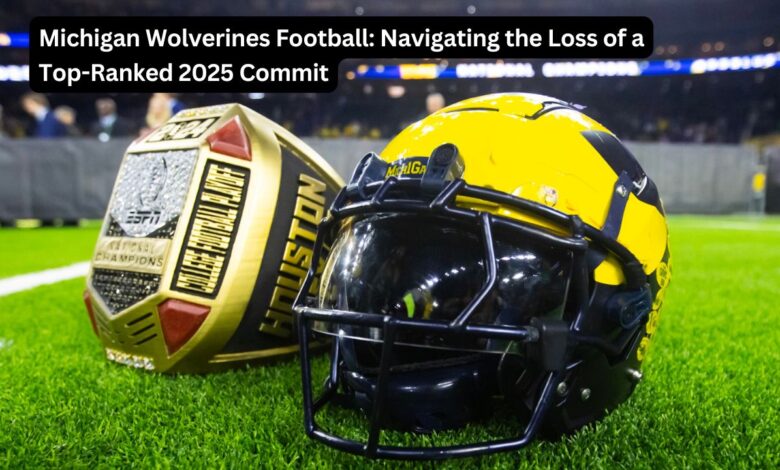Michigan Wolverines Football: Navigating the Loss of a Top-Ranked 2025 Commit

The Michigan Wolverines football program, a cornerstone of college football excellence, recently encountered a significant challenge with the decommitment of a top-ranked 2025 recruit, who has opted to join an SEC school. This development has sparked widespread discussion within the Wolverines community, raising concerns about the future direction of the program and its impact on Michigan’s long-term recruiting efforts.
The Impact of Losing a Top-Ranked Recruit
Recruitment is the foundation upon which successful college football programs are built, and Michigan has consistently been a top player in the recruitment game, attracting elite talent year after year. However, the recent decision by a highly-touted 2025 recruit to commit elsewhere represents a critical challenge for the Wolverines. This particular player was projected to be a pivotal addition to Michigan’s future roster, not only for his on-field abilities but also for the leadership and influence he was expected to bring to the team.
The loss of such a key recruit to an SEC school highlights the intense competition that defines college football recruitment today. The SEC, known for its dominant football programs and impressive track record, has been particularly aggressive in securing top-tier talent, making it even more difficult for programs like Michigan in the Big Ten to maintain a stronghold on premier recruits.
Michigan’s Recruiting Strategy: A Deeper Insight
Despite this recent setback, the Michigan Wolverines football program remains one of the most respected and formidable forces in college football. Under the guidance of head coach Jim Harbaugh, Michigan has developed a comprehensive and strategic approach to recruiting, one that emphasizes not just athletic prowess but also character, academic achievement, and a strong fit with the program’s core values. This well-rounded recruiting philosophy has allowed Michigan to consistently field competitive teams that perform at the highest levels in the Big Ten and nationally.
Michigan’s recruiting strategy is deeply rooted in identifying recruits who exemplify both the physical and mental attributes required to thrive in a rigorous academic and athletic environment. This approach has been instrumental in building a program that is not only successful on the field but also known for its integrity and commitment to the overall development of its student-athletes.
However, the decommitment of a top-ranked recruit serves as a reminder that the recruiting landscape is constantly evolving. To remain competitive, Michigan must continue to adapt its recruiting strategy, building even stronger relationships with recruits and their families and highlighting the unique opportunities that come with being part of the Wolverines family. These opportunities include playing in front of one of the most passionate fan bases in college football, receiving a world-class education, and joining a network of alumni who are leaders in various fields.
The SEC Factor: Competing with the Best
The dominance of the SEC in college football is well-documented, and the conference’s ability to attract and develop top talent is a major factor in its sustained success. For programs like Michigan, competing with the SEC in recruiting requires not only a compelling pitch but also a clear and attractive vision for a recruit’s future.
Michigan’s storied history, cutting-edge facilities, and strong alumni network make it an appealing choice for top recruits. However, the SEC’s reputation for producing NFL-caliber talent and its consistent track record of competing for national championships present a significant challenge. Recruits who aspire to play at the highest levels are often drawn to the SEC’s proven pathway to the NFL and its highly competitive environment.
To effectively compete with the SEC, Michigan must continue to invest in its football program, ensuring it remains at the forefront of college football in every aspect, from facilities to coaching staff and player development. Additionally, Michigan should emphasize its unique strengths, such as its commitment to academic excellence and the vibrant, supportive community in Ann Arbor, to attract recruits who are looking for a well-rounded college experience that goes beyond just football.
Looking Ahead: The Future of Michigan Wolverines Football
While the loss of a top-ranked recruit is undeniably a blow, it is essential to consider this development within the broader context of Michigan Wolverines football. The program has a long and storied history of resilience and success, and the decision of one recruit does not define its trajectory.
Michigan’s coaching staff is already hard at work to mitigate the impact of this loss, identifying and pursuing other talented prospects who can contribute to the program’s continued success. The Wolverines’ ability to respond to challenges and adapt to changing circumstances is a testament to the strength and stability of the program.
As the Wolverines look to the future, refining and evolving their recruiting strategy will be key to maintaining their status as a top contender in the national landscape. By focusing on building strong, lasting relationships with recruits and their families and emphasizing the unique advantages of being a Wolverine, Michigan can continue to attract the best talent and remain a dominant force in college football.
Conclusion
The Michigan Wolverines football program is currently facing a challenge with the loss of a top-ranked 2025 commit to an SEC school. However, this situation also presents an opportunity for the Wolverines to reassess and strengthen their recruiting strategy. By continuing to build on their strong foundation and adapting to the evolving college football landscape, Michigan can maintain its position as a top contender in national recruiting.




